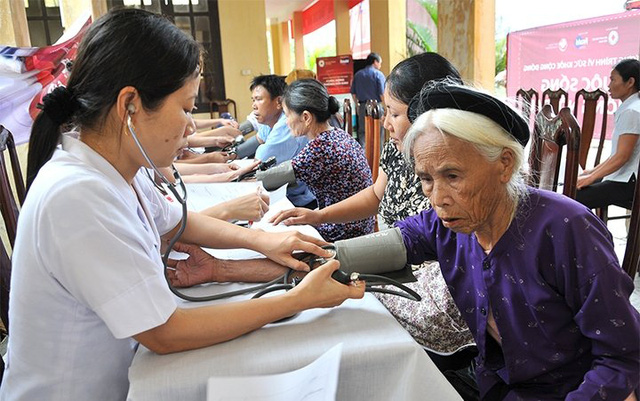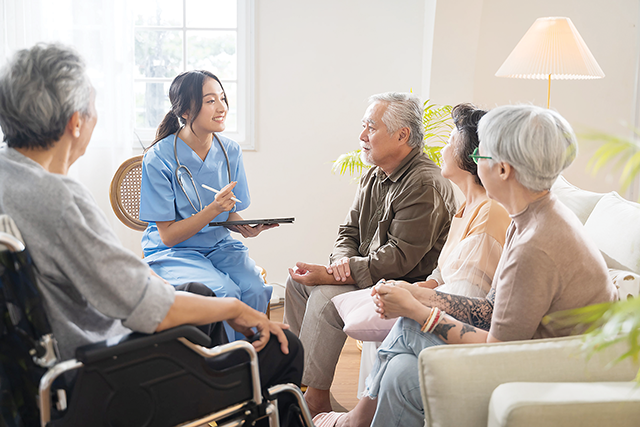Who is consider an elderly under the law in Vietnam?
Who is consider an elderly under the law in Vietnam? - Anh Tai (Nam Dinh)
Who is consider an elderly under the law in Vietnam?
Pursuant to the Law on the Elderly 2009, The elderly are Vietnamese citizens aged full 60 or over. The elderly have the following rights:
- To be guaranteed with basic food, clothing, lodging, movement and healthcare needs;
- To decide to live with their children, grandchildren or to live separately at their own will;
-To be given priority in the use of services under this Law and other relevant laws:
- To be provided with conditions to participate in cultural, educational, physical training, sports, entertainment, tourist and recreation activities;
- To be provided with conditions to work in suitability to their health and professions and other conditions in order to bring into full play their role;
- To be exempt from contributions to social activities, except voluntary contributions;
- To be given priority in the receipt of relief in cash or in kind, healthcare and lodgings with a view to overcoming initial difficulties when they meet with difficulties due to consequences of natural disasters or other force majeure circumstances;
- To join in the Vietnam Elderly Association under the Association's charter;
- Other rights defined by law.
The elderly have the following obligations:
- To set bright examples in moral quality and lifestyles: to educate young generations to preserve and promote the fine traditions of the nation; to be exemplary in observing and mobilizing families and communities to observe the Party's policies and line and the State's laws;
- To pass their precious experiences to younger generations;
- Other obligations defined by law.

Who is consider an elderly under the law in Vietnam? (Internet image)
Medical examination and treatment for the elderly in Vietnam
Article 12 of the Law on the Elderly 2009 stipulates the medical examination and treatment for the elderly as follows:
- Prioritized medical examination and treatment for the elderly shall be carried out as follows:
+ Persons aged full 80 or older shall be given priority for medical examination before other persons, except emergency patients, under-6 children and heavily disabled people;
+ Elderly inpatients are arranged proper hospital beds.
- Hospitals, except pediatrics hospitals, have the following responsibilities:
+ To organize gerontologic departments or set aside a number of beds for treatment of elderly patients:
+ To rehabilitate elderly patients' health after pernicious disease treatments at hospital and guide their further treatment and care at home;
+ To combine traditional medicine with modern medicine in treatment and guide methods of non-medicine treatment at grassroots health establishments for elderly patients:
+ The Stale encourages organizations and individuals to give free-of- charge medical examination and treatment to the elderly.
Primary healthcare at places of residence in Vietnam
Pursuant to Article 13 of the Law on the Elderly 2009, commune, ward, township health stations have the following responsibilities:
- To carry out propaganda and dissemination in different forms of common healthcare knowledge; guide the elderly in skills of disease prevention and treatment and self-healthcare;
- To compile files for the elderly's health monitoring and management;
- To give medical examination and treatment suitable to their specialization to the elderly;
- To coordinate with higher-level medical establishments in organizing periodical health checkups for the elderly.
Commune, ward or township health stations shall send health workers to conduct medical examination and treatment at places of residence of lonely and seriously ill elderly persons who cannot go to medical establishments for examination and treatment. Commune, ward or township People's Committees shall support the transport of patients defined in this Clause to medical establishments at the proposal of commune, ward or township health stations.
Mai Thanh Loi
- Key word:
- elderly
- in Vietnam
- Cases of land rent exemption and reduction under the latest regulations in Vietnam
- Economic infrastructure and social infrastructure system in Thu Duc City, Ho Chi Minh City
- Regulations on ordination with foreign elements in religious organizations in Vietnam
- Increase land compensation prices in Vietnam from January 1, 2026
- Determination of land compensation levels for damage during land requisition process in Vietnam
- Who is permitted to purchase social housing according to latest regulations in Vietnam?
-

- Approval of the Scheme for the elderly's participation ...
- 18:58, 27/02/2025
-

- Emergency response and search and rescue organizations ...
- 10:29, 11/09/2024
-

- Handling of the acceptance results of ministerial ...
- 09:30, 11/09/2024
-

- Guidance on unexploded ordnance investigation ...
- 18:30, 09/09/2024
-

- Sources of the National database on construction ...
- 16:37, 09/09/2024
-

- Notable new policies of Vietnam effective as of ...
- 16:26, 11/04/2025
-
.Medium.png)
- Notable documents of Vietnam in the previous week ...
- 16:21, 11/04/2025
-
.Medium.png)
- Notable documents of Vietnam in the previous week ...
- 16:11, 02/04/2025
-
.Medium.png)
- Notable new policies of Vietnam to be effective ...
- 16:04, 02/04/2025
-
.Medium.png)
- Notable new policies of Vietnam effective from ...
- 14:51, 21/03/2025
 Article table of contents
Article table of contents
